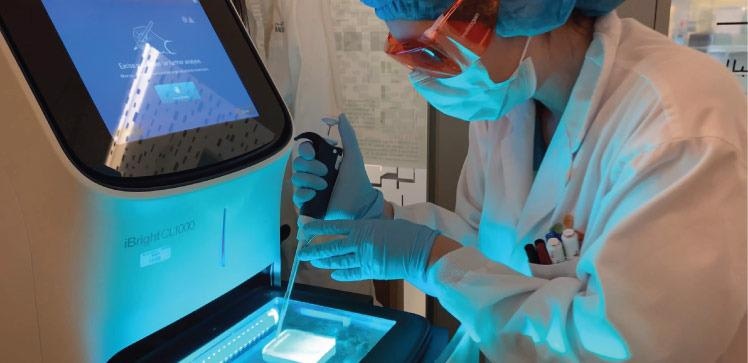One out of every 500 to 1,000 boys is born with one or more extra X chromosomes, which can cause a variety of symptoms as the extra chromosomes to including infertility, larger breasts, osteoporosis, diabetes, cardiac problems, intellectual incapacity, and cancer. KAUST scientists have now employed reprogrammed stem cells from persons with this disease to better understand how it develops.
 Veronica Astro (pictured) and a team of KAUST bioscientists used stem cell analyses to improve understanding of the development of surplus X chromosomes in newborn males. Image Credit: 2022 King Abdullah University of Science & Technology.
Veronica Astro (pictured) and a team of KAUST bioscientists used stem cell analyses to improve understanding of the development of surplus X chromosomes in newborn males. Image Credit: 2022 King Abdullah University of Science & Technology.
Males are born with one X and one Y chromosome, while females are born with two X chromosomes. Except for a tiny number of “escape” genes, one of the two X chromosomes in females is normally inactivated. Males with one (Klinefelter syndrome) or more (higher grade sex chromosomal aneuploidies, or HGAs) extra X chromosomes experience X inactivation. However, the additional escape genes remain.
Scientists have never focused on which genes are responsible for the plethora of features in Klinefelter syndrome and HGAs. We generated the largest cohort of induced pluripotent stem cells derived from patient fibroblasts to study the effects of having extra copies of the X chromosome in males.”
Veronica Astro, Research Scientist, Biological and Environmental Science and Engineering Division, King Abdullah University of Science and Technology
Astro added, “We also took advantage of KAUST’s cutting-edge technologies to compare gene expression between these and healthy stem cells to identify the genes that are aberrantly expressed in this genetic condition.”
The majority of escape genes were discovered in pseudo-autosomal region 1 on the short arm of the X chromosome, according to the researchers (PAR1). With each extra X chromosome, eleven were connected to the increasing severity of symptoms. When the researchers manipulated the stem cells to grow into pre-liver and pre-pancreas cells, these genes remained mostly active. Their action was dose-dependent, rising as the number of X chromosomes in the cells grew.
To further test their stem cells, the scientists looked at transcription factor changes and discovered that a protein called nuclear respiratory factor 1 (NRF1) was highly expressed in stem cells with extra X chromosomes, affecting a gene called zinc finger protein X-linked (ZFX).
Importantly, we generated the first ever described cellular platform of induced pluripotent stem cells with various degrees of X chromosome aneuploidies that can be exploited to study the consequences of gene overdosage in early embryogenesis.”
Antonio Adamo, Study Author and Bioscientist, Biological and Environmental Science and Engineering Division, King Abdullah University of Science and Technology
More research into the processes behind the characteristics exhibited in patients with Klinefelter syndrome and HGAs is needed. The stem cell platform might potentially be used to evaluate new treatments for various diseases.
To investigate how excess X chromosomes affect different organs, Adamo’s team is currently developing induced pluripotent stem cells with variable degrees of X chromosome aneuploidies into disease-relevant cell types, such as heart, nerve, pancreas, and sperm cells.
Source:
Journal reference:
Astro, V., et al. (2022) Pseudoautosomal region 1 overdosage affects the global transcriptome in iPSCs from patients with Klinefelter syndrome and high-grade X chromosome aneuploidies. Frontiers in Cell and Developmental Biology. doi.org/10.3389/fcell.2021.801597.